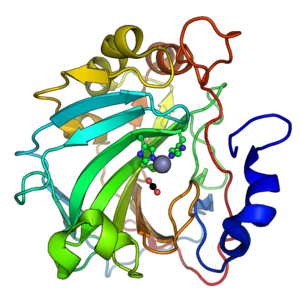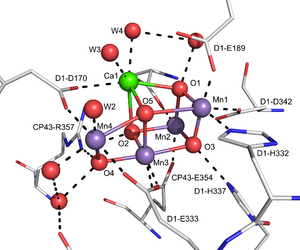Mineral (nutrient) facts for kids

In nutrition, a mineral is a chemical element that your body needs to stay healthy and work properly. Minerals are one of the four main types of essential nutrients your body can't make on its own. The others are vitamins, essential fatty acids, and essential amino acids.
Your body needs larger amounts of some minerals, called major minerals. These include calcium, phosphorus, potassium, sodium, and magnesium. You also need very small amounts of other minerals, called trace elements, like iron, zinc, and iodine.
Plants get minerals from the soil, and animals get them by eating plants. When you eat plants and animals, you get the minerals your body needs to grow and have energy.
Contents
Minerals Your Body Needs
Your body is made up of many different chemical elements. About 96% of your body's weight comes from just four elements: carbon, hydrogen, oxygen, and nitrogen. These are usually not called "minerals" in nutrition.
The rest of your body is made of minerals. The most common mineral is calcium, which makes up about 1.5% of your body weight. Most of it is in your bones and teeth! After calcium comes phosphorus. Other important minerals like potassium, sodium, chlorine, sulfur, and magnesium make up a smaller part. All the other minerals, the trace elements, make up just a tiny fraction, but they are still very important for your health.
| Essential elements for higher organisms (eucarya). | |||||||||||||||||||||||||||||||||||||||||||||||||||||||||||||||||||||||||||||||||||||||||||||||||||||||||||||||||||||||
|---|---|---|---|---|---|---|---|---|---|---|---|---|---|---|---|---|---|---|---|---|---|---|---|---|---|---|---|---|---|---|---|---|---|---|---|---|---|---|---|---|---|---|---|---|---|---|---|---|---|---|---|---|---|---|---|---|---|---|---|---|---|---|---|---|---|---|---|---|---|---|---|---|---|---|---|---|---|---|---|---|---|---|---|---|---|---|---|---|---|---|---|---|---|---|---|---|---|---|---|---|---|---|---|---|---|---|---|---|---|---|---|---|---|---|---|---|---|---|---|
| H | He | ||||||||||||||||||||||||||||||||||||||||||||||||||||||||||||||||||||||||||||||||||||||||||||||||||||||||||||||||||||||
| Li | Be | B | C | N | O | F | Ne | ||||||||||||||||||||||||||||||||||||||||||||||||||||||||||||||||||||||||||||||||||||||||||||||||||||||||||||||||
| Na | Mg | Al | Si | P | S | Cl | Ar | ||||||||||||||||||||||||||||||||||||||||||||||||||||||||||||||||||||||||||||||||||||||||||||||||||||||||||||||||
| K | Ca | Sc | Ti | V | Cr | Mn | Fe | Co | Ni | Cu | Zn | Ga | Ge | As | Se | Br | Kr | ||||||||||||||||||||||||||||||||||||||||||||||||||||||||||||||||||||||||||||||||||||||||||||||||||||||
| Rb | Sr | Y | Zr | Nb | Mo | Tc | Ru | Rh | Pd | Ag | Cd | In | Sn | Sb | Te | I | Xe | ||||||||||||||||||||||||||||||||||||||||||||||||||||||||||||||||||||||||||||||||||||||||||||||||||||||
| Cs | Ba | Lu | Hf | Ta | W | Re | Os | Ir | Pt | Au | Hg | Tl | Pb | Bi | Po | At | Rn | ||||||||||||||||||||||||||||||||||||||||||||||||||||||||||||||||||||||||||||||||||||||||||||||||||||||
|
Legend:
The four basic organic elements Quantity elements Essential trace elements Essentiality or function debated Not essential in humans, but essential/beneficial for some non-human eucarya |
What Do Minerals Do?
Different minerals have different jobs in your body. Here is a look at some of the most important ones, what they do, and what foods you can find them in.
| Mineral | What It Does For You | Good Food Sources |
|---|---|---|
| Potassium | Helps your muscles and nerves work correctly. It also helps keep the right balance of water in your body. | Sweet potatoes, tomatoes, beans, dairy products, seafood, bananas, and oranges. |
| Chlorine | Needed to make hydrochloric acid in your stomach, which helps you digest food. | Table salt (sodium chloride) is the main source. |
| Sodium | Works with potassium to balance fluids in your body and helps your nerves send signals. | Table salt, milk, and spinach. |
| Calcium | Builds strong bones and teeth. It also helps your muscles, heart, and digestive system stay healthy. | Dairy products, eggs, canned fish with bones (like salmon), green leafy vegetables, nuts, and seeds. |
| Phosphorus | A key part of bones and teeth. It also helps your body make and use energy. | Red meat, dairy foods, fish, poultry, bread, rice, and oats. |
| Magnesium | Important for healthy bones, making energy, and helps with over 300 different processes in your body. | Spinach, legumes, nuts, seeds, whole grains, and avocado. |
| Iron | Carries oxygen in your blood to all your cells. This prevents a condition called anemia. | Meat, seafood, nuts, beans, and dark chocolate. |
| Zinc | Helps your immune system fight germs and is important for healing cuts and scrapes. | Oysters, red meat, poultry, nuts, whole grains, and dairy products. |
| Manganese | Helps protect your cells from damage and is important for making strong bones. | Grains, legumes, seeds, nuts, leafy vegetables, tea, and coffee. |
| Copper | Helps your body make energy and keeps your nerves and immune system healthy. | Liver, seafood, oysters, nuts, and seeds. |
| Iodine | Needed by your thyroid gland to make important hormones that control how your body uses energy. | Seaweed, grains, eggs, and iodized salt. |
| Molybdenum | Helps your body break down certain substances and get rid of waste products. | Legumes, whole grains, and nuts. |
| Selenium | Works as an antioxidant, which means it protects your cells from damage. | Brazil nuts, seafood, organ meats, meats, grains, and dairy products. |
| Cobalt | A key part of vitamin B12, which is needed to make red blood cells and keep your nervous system healthy. | Meat, liver, shellfish, and crab. |
| Sulfur | A building block for proteins and helps protect your cells. | Nuts, legumes, meats, eggs, fish, and seafood. |
| Bromine | Helps build and repair tissues in your body. | Found in small amounts in many foods. |
How to Get Your Minerals
The best way to get the minerals you need is by eating a variety of healthy foods. Different foods are rich in different minerals. For example, milk and yogurt are great for calcium, while meat and beans are good sources of iron.
Sometimes, foods have minerals added to them. This is called fortification. For example, you might see orange juice with added calcium or table salt with added iodine (iodized salt).
While most people can get all the minerals they need from their diet, some people might take dietary supplements. These are pills or powders that contain minerals. It's always best to get nutrients from food first.
Minerals for Plants, Too!
Plants need minerals just like people do. They absorb them from the soil through their roots. These minerals help plants grow strong and healthy.
Farmers often use fertilizers to add minerals to the soil if it doesn't have enough. This helps crops grow better. When you eat fruits and vegetables, you are getting the minerals that the plant took from the soil.
Getting the Right Amount
It's important to get the right amount of each mineral—not too little, and not too much. Your body needs a good balance.
Think of it like adding salt to your food. A little bit makes it taste good, but too much can make it unhealthy. The same is true for minerals. Getting minerals from the food you eat is usually the safest way to get what you need. Taking too much of a mineral in a supplement can sometimes cause problems, like an upset stomach. That's why it's important to eat a balanced diet.
Minerals in Nature
Minerals are a big part of the natural world. Many sea creatures use minerals from the ocean to build their hard parts. For example, clams and snails use calcium to build their seashells, and animals with bones use it to make their skeletons strong.
In the soil and oceans, tiny living things like bacteria and fungi play an important role. They help break down dead plants and animals, which recycles the minerals and puts them back into the environment. This makes the minerals available for new plants to use, continuing the cycle of life.
See also
- Food composition
- Human nutrition
- Micronutrient
- Mineral deficiency
 | Mary Eliza Mahoney |
 | Susie King Taylor |
 | Ida Gray |
 | Eliza Ann Grier |


